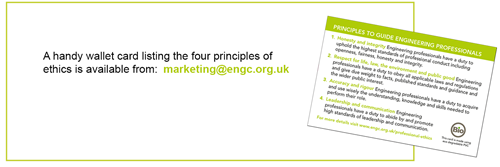Engineering Council

In 2005 the Royal Academy of Engineering and the Engineering Council jointly created a statement of ethical principles to guide engineering practice and behaviour. A revised statement was jointly produced in 2017.
The statement is the result of wide consultation, both within the engineering profession and with other professionals specialising in applied ethics. It contains four fundamental principles and is designed to form the core of the codes of conduct published by the professional engineering institutions. All registered engineers and technicians have committed to working in an ethical and socially responsible manner in accordance with their institution's code of conduct.
The Engineering Council and the Royal Academy of Engineering believe that all persons engaged in engineering at any level, from the youngest apprentice and student, should be educated and encouraged to think and work in accordance with these ethical principles. The statement is therefore offered to employers and to education, training and qualification providers to adopt or include in their curricula as they see fit. The aim is for engineering to be seen and recognised by the public as a trusted and ethical profession.
The statement is underpinned by four fundamental principles:
−
Engineering professionals have a duty to uphold the highest standards of professional conduct including openness, fairness, honesty and integrity.
They should:
- act in a reliable and trustworthy manner
- be alert to the ways in which their work and behaviour might affect others and respect the privacy, rights and reputations of other parties and individuals
- respect confidentiality
- declare conflicts of interest
- avoid deception and take steps to prevent or report corrupt practices or professional misconduct
- reject bribery and improper influence
−
Engineering professionals have a duty to obey all applicable laws and regulations and give due weight to facts, published standards and guidance and the wider public interest.
They should:
- hold paramount the health and safety of others and draw attention to hazards
- ensure their work is lawful and justified
- recognise the importance of physical and cyber security and data protection
- respect and protect personal information and intellectual property
- protect, and where possible improve, the quality of built and natural environments
- maximise the public good and minimise both actual and potential adverse effects for their own and succeeding generations
- take due account of the limited availability of natural resources
- uphold the reputation and standing of the profession
−
Engineering professionals have a duty to acquire and use wisely the understanding, knowledge and skills needed to perform their role.
They should:
- always act with care perform services only in areas in which they are currently competent or under competent supervision
- keep their knowledge and skills up to date
- assist the development of engineering knowledge and skills in others
- present and review theory, evidence and interpretation honestly, accurately, objectively and without bias, while respecting reasoned alternative views
- identify, evaluate, quantify, mitigate and manage risks not knowingly mislead or allow others to be misled
−
Engineering professionals have a duty to abide by and promote high standards of leadership and communication.
They should:
- be aware of the issues that engineering and technology raise for society, and listen to the aspirations and concerns of others
- promote equality, diversity and inclusion
- promote public awareness and understanding of the impact and benefits of engineering achievements
- be objective and truthful in any statement made in their professional capacity
- challenge statements or policies that cause them professional concern
Download the Statement of Ethical Principles
… (Read more)

